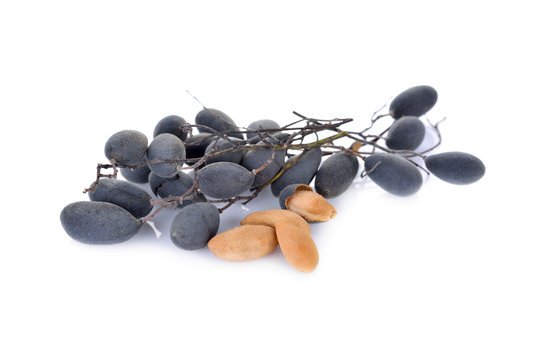
African Velvet tamarind, botanical name (Dialium Guineense) is a fruit native to Africa.
It is found in Nigeria, Ghana, Togo, Mali, Sao Tome and Principe, Sierra Leone, Senegal, Equatorial Guinea, Cameroon, and some other African countries. Other names of the fruit are Africa velvet tamarind, black velvet, tumble tree, etc.
In Nigeria, It is popularly known as Awin in Yoruba, Icheku in Igbo, and Tsamiyar kurm in Hausa.
The seed is enclosed in a dry, brownish, sweetly acidic, edible pulp, which can be eaten after peeling the shell.
The pulp is orange, and has a sweet-sour taste, and astringent flavor. The pulp can also be used for making jellies, and beverages.
The bark and leaves of the plant are also used in traditional medicine.
The tree normally produces flowers from September to October, and fruits from October to January, or March to May in some locations. The peak of harvesting is between March and April.
However, not many know the numerous health benefits inherent in this fruit.
Nutritional Content
Black velvet Tamarind contains a high level of fructose and glucose with vitamins such as ascorbic acid, B-
carotene and tocopherol, and minerals such as iron, zinc, phosphorus, calcium, potassium, magnesium, manganese, copper.
The pulp contains more iron, magnesium, potassium, and vitamin C than the seed. The pulp also contains dietary fiber, which helps to improve bowel movement and protect the colon against cancer.
The stem bark extract of black velvet tamarind contain alkaloids, cardiac glycosides, carbohydrates, flavonoids, tannins, phlobatannins, resins, saponins, steroids, terpenoids, triterpenes, and reducing sugars.
Here are some of the health benefits of this plant.
1. Treats Ulcer
Black velvet tamarind aids in the treatment of ulcers. The black velvet tamarind increases gastric mucus secretion which helps heal the ulcer. In an experiment using ethanol/HCl and indomethacin as ulcerogen, the extract of Dialium guineense reduced the ulcer index, promoting the healing of the ulcer due to increased mucus secretion induced by the extract.
2. Acts as an antioxidant
It contains tartaric acid, a strong antioxidant that protects the body from free radicals, which cause damage to the body’s vital organs and cells.
3. Treats hemorrhoids
Piles and hemorrhoids are swollen veins in the anal canal caused by too much pressure in the pelvic and rectal areas and while not life-threatening, these veins can be very painful.
One of the nutritional benefits of black velvet tamarind is its ability to treat hemorrhoids and piles. The ethanol found in black velvet tamarind is excellent for hemorrhoid treatment.
ALSO READ: 6 Health Benefits Of Agbalumo (African Star Apple)
4. Improves oral health
Black velvet tamarind aids in treating oral issues including toothaches. Plaque, caries, and bacteria—three things that are most responsible for toothaches—can be removed by the substances in black velvet tamarind. The stem of this plant is also used as a chewing stick. It contains saponins, which may inhibit dental caries.
5. Relieves menstrual cramps
Black velvet tamarind contains considerable analgesic properties that help to ease pain, especially the discomfort associated with menstruation. It can be taken along with papaya leaf, salt, and water to work effectively.
6. Prevents hypertension
It is well known that black velvet tamarind contains potassium. Potassium has the ability to regulate heart rate and facilitate blood pumping. In other words, black velvet tamarind can lessen the chance of developing high blood pressure.
7. Treats malaria
Malaria treatment is one of the health benefits of black velvet tamarind. Black velvet tamarind has the ability to inhibit the growth of plasmodium falciparum, the main cause of malaria.
8. Improves lactation
The pulp of black velvet tamarind includes nutrients needed for milk secretion, suggesting that it may help with breastfeeding.
Because it will facilitate increased breast milk supply, it is advantageous for expectant moms and mothers who are breastfeeding.
9. Boosts the immune system
Black velvet tamarind is packed with Vitamin A and Vitamin C, which are integral in producing energy. It also has iron and calcium that help in immunity–boosting and maintaining strong bones.



